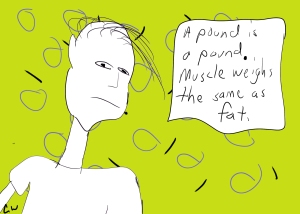I, being interested in making myself a healthier person, read articles about health. This lends to my theory that I fall somewhere on the masochist spectrum (if such a thing exists).
But why? Why is enjoying health articles the same as deriving pleasure from pain and humiliation inflicted on one’s self?
Well I’ll tell you why. Most of them are full of crap.
Now, I could go on and on, listing the veritable ocean of crap health articles based on bunk research (recently, a man demonstrated how easy it is to sway people via the web, using bunk research). But, I won’t. I’m only going to address the illogical nonsense that is bothering me the most at this time, the “muscle weighs the same as fat” stupidity. This is a phenomenon I have encountered in forums and on social networks countless times. Poorly worded health articles, at least in part, are to blame.
I can’t tell you how many articles I have read that say something along the lines of, “A pound is a pound. Muscle does not weigh more than fat.” Then, they go on to say something contradictory like, “Yes, muscle is more dense than fat, so by volume it weighs more.” Do a quick Google search and you’ll find some. Many of these articles are padded with verifiable facts. However, people like to go nuts with catchy phrases like “a pound is a pound.” It seems like the worst part of the articles are being retained, while the good parts are just…inconveniently there.
For instance, in this article, the author states:
“In the context of fitness and recording body weight numbers on scales, the statement ‘muscle weighs more than fat’ does not hold much weight. It just does not make sense because one pound is one pound.” [emphasis added]
Thanks for the stupid pun, buddy. Notice how the author skillfully takes credence away from the idea that muscle weighs more than fat, using a sassy truth bomb, “one pound is one pound.” I guess it doesn’t make sense in the context of simply recording a number of pounds. What’s odd is, he says this, yet goes on to say that it isn’t really about the numbers. So, these sentences do not make sense in the context of the article. Anyway, let’s continue.
“The truth is that when placed on a scale, one pound of fat is going to weigh the same as one pound of muscle – just like one pound of bricks is going to weigh the same as one pound of feathers.”
Ah, I see. So that’s why “muscle is heavier than fat” doesn’t “hold much weight.” Muscles, fat, bricks, feather, a pound is a pound! This is great! May I proceed to lose weight by laying in a hospital bed while my muscles go into atrophy? Please tell me more!
“So yes, muscle seems to weigh more because there is a difference in the volume between the two. When a cubic inch of muscle and a cubic inch of fat are measured, the cubic inch of muscle will weigh more. As you add compact muscle mass to the body, body weight may increase. However, pound for pound, muscle and fat weigh the same.” [emphasis mine]
Let me paraphrase that last bit: “Muscle weighs more than fat. However, muscle and fat weigh the same. Because, you know, a pound is a pound.” Thanks for clearing that up. The rest of the article contains some interesting information, but I couldn’t get over the opening section.
In another article, from the insanely popular Weight Watchers, you get an even more brazen example (link, if your brain can stand it). This one goes straight to the top shelf:
“Muscle does not weigh more than fat, any more than lead weighs more than feathers.”
Ugh. Again with this. Actually, I have a rousing suspicion that Weight Watchers is to blame for the popularity of this nonsense.
I’ll spare you the rest. The author goes on to say a mix of truths and false contradictory stuff. The idea is supposed to be that people shouldn’t use the “muscle weighs more than fat” fact to excuse unnecessary weight gain. Fair enough.
However, now we have people throwing “a pound of muscle weighs the same as a pound of fat” and “a pound is a pound” like its gospel truth. I blame poorly written articles like the ones referenced above. Many have devolved it further, resulting in, “muscle does not weight more than fat,” which is untrue (as the articles above ironically manage to point out, while attempting to discourage the notion).
By this un-logic, everything weighs the same. A ton of helium weighs the same as a one ton truck. Hey, a ton is a ton! Fill a gallon container with water, and it weighs 8 pounds. Fill the same container with, say, osmium (the densest element on Earth), and it weights somewhere around 225 pounds. But, you know, a pound of osmium weighs the same as a pound of water. They weigh the same!
Now hear this, people. A pound is not “just” a pound. It is a pound of something, and that something matters. Whether it is a pound of fat, muscle, water, shark meat, or malignant tumor, is important. If you’re trying to lose weight it is important to know that some tissues weigh more than others. If you haven’t reached your weight loss goal and yet your body fat percentage is like Schwarzenegger’s in “Pumping Iron” then you better believe muscle weighs more than fat.
When we’re weighing ourselves on a scale, I think that what we’re really concerned about is volume. The reason for that is, we want to have less fat, more muscle (or vice versa in some cases), or the same of either. Some of us want clothes to fit better, or muscles to be more pronounced. Some of us just want to be sure we are maintaining a healthy BMI. The problem is, we are made up of many different tissues each with a different density, but the scale only tells us our weight. So, we tend to go by weight, sometimes to a fault.
But that’s no reason to go around spreading an array of bull crap, ranging from fluff rhetoric like “a pound is a pound,” to misleading bunk like “muscle does not weigh more than fat.”
There, I feel better now.


